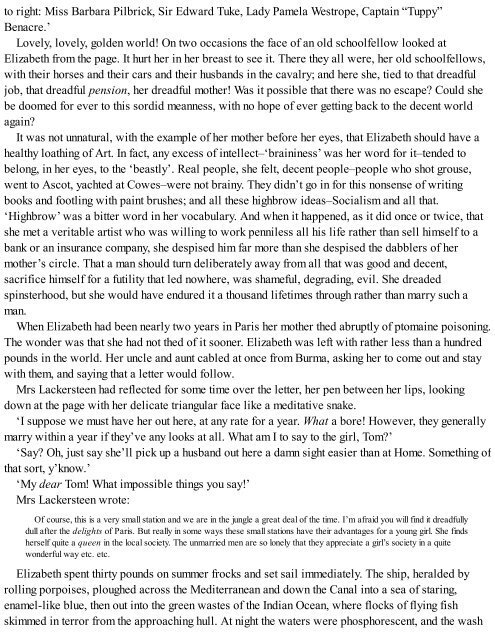563296589345
You also want an ePaper? Increase the reach of your titles
YUMPU automatically turns print PDFs into web optimized ePapers that Google loves.
to right: Miss Barbara Pilbrick, Sir Edward Tuke, Lady Pamela Westrope, Captain “Tuppy”<br />
Benacre.’<br />
Lovely, lovely, golden world! On two occasions the face of an old schoolfellow looked at<br />
Elizabeth from the page. It hurt her in her breast to see it. There they all were, her old schoolfellows,<br />
with their horses and their cars and their husbands in the cavalry; and here she, tied to that dreadful<br />
job, that dreadful pension, her dreadful mother! Was it possible that there was no escape? Could she<br />
be doomed for ever to this sordid meanness, with no hope of ever getting back to the decent world<br />
again?<br />
It was not unnatural, with the example of her mother before her eyes, that Elizabeth should have a<br />
healthy loathing of Art. In fact, any excess of intellect–‘braininess’ was her word for it–tended to<br />
belong, in her eyes, to the ‘beastly’. Real people, she felt, decent people–people who shot grouse,<br />
went to Ascot, yachted at Cowes–were not brainy. They didn’t go in for this nonsense of writing<br />
books and footling with paint brushes; and all these highbrow ideas–Socialism and all that.<br />
‘Highbrow’ was a bitter word in her vocabulary. And when it happened, as it did once or twice, that<br />
she met a veritable artist who was willing to work penniless all his life rather than sell himself to a<br />
bank or an insurance company, she despised him far more than she despised the dabblers of her<br />
mother’s circle. That a man should turn deliberately away from all that was good and decent,<br />
sacrifice himself for a futility that led nowhere, was shameful, degrading, evil. She dreaded<br />
spinsterhood, but she would have endured it a thousand lifetimes through rather than marry such a<br />
man.<br />
When Elizabeth had been nearly two years in Paris her mother thed abruptly of ptomaine poisoning.<br />
The wonder was that she had not thed of it sooner. Elizabeth was left with rather less than a hundred<br />
pounds in the world. Her uncle and aunt cabled at once from Burma, asking her to come out and stay<br />
with them, and saying that a letter would follow.<br />
Mrs Lackersteen had reflected for some time over the letter, her pen between her lips, looking<br />
down at the page with her delicate triangular face like a meditative snake.<br />
‘I suppose we must have her out here, at any rate for a year. What a bore! However, they generally<br />
marry within a year if they’ve any looks at all. What am I to say to the girl, Tom?’<br />
‘Say? Oh, just say she’ll pick up a husband out here a damn sight easier than at Home. Something of<br />
that sort, y’know.’<br />
‘My dear Tom! What impossible things you say!’<br />
Mrs Lackersteen wrote:<br />
Of course, this is a very small station and we are in the jungle a great deal of the time. I’m afraid you will find it dreadfully<br />
dull after the delights of Paris. But really in some ways these small stations have their advantages for a young girl. She finds<br />
herself quite a queen in the local society. The unmarried men are so lonely that they appreciate a girl’s society in a quite<br />
wonderful way etc. etc.<br />
Elizabeth spent thirty pounds on summer frocks and set sail immediately. The ship, heralded by<br />
rolling porpoises, ploughed across the Mediterranean and down the Canal into a sea of staring,<br />
enamel-like blue, then out into the green wastes of the Indian Ocean, where flocks of flying fish<br />
skimmed in terror from the approaching hull. At night the waters were phosphorescent, and the wash









![Genki - An Integrated Course in Elementary Japanese II [Second Edition] (2011), WITH PDF BOOKMARKS!](https://img.yumpu.com/58322134/1/180x260/genki-an-integrated-course-in-elementary-japanese-ii-second-edition-2011-with-pdf-bookmarks.jpg?quality=85)
![Genki - An Integrated Course in Elementary Japanese I [Second Edition] (2011), WITH PDF BOOKMARKS!](https://img.yumpu.com/58322120/1/182x260/genki-an-integrated-course-in-elementary-japanese-i-second-edition-2011-with-pdf-bookmarks.jpg?quality=85)





